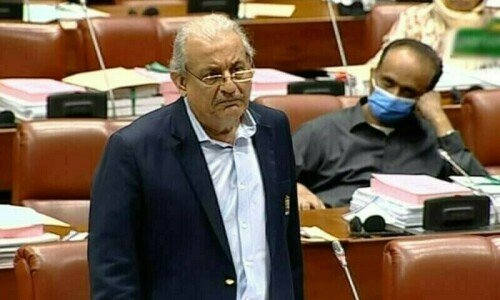Former Senate Chairman Raza Rabbani said on Friday that the Special Investment Facilitation Board was “violating provincial autonomy” by dealing with education-related matters.
The statement comes a day after the SIFC called a meeting to review the new education policy and discuss the “educational emergency” proposal.
SIFC was established in June last year as part of an “economic recovery plan” drawn up by civilian and military officials to tap “untapped potential in key sectors” and attract foreign direct investment (FDI).
The then cabinet approved a number of initiatives, including proposed legislation to amend the Investment Council Ordinance to empower the SIFC to facilitate foreign direct investment.
In November, the International Monetary Fund (IMF) raised questions about the creation of the SIFC and advised Pakistan not to create a preferred investor group or disrupt the country and ensure transparency and accountability in its business transactions.
Last week, the newly appointed Minister of Education, Dr. Khalid Maqbool Siddiqui has called for an “educational emergency” to address the alarming number of out-of-school children (OOSC) across the country. He said a national conference would be organized in collaboration with SIFC.
On Thursday, the SIFC expressed concern over the alarming number of OOSCs in the country and called for urgent steps to formulate a comprehensive framework and strategy to address the challenge.
The draft of the new education policy was also discussed at the meeting. The 2009 education policy is currently in place and is considered outdated. At the direction of the SIFC, the Ministry of Education is working on the preparation of a new education policy.
Rabbani today condemned SIFC’s handling of the issue of OOSC and education policy.
In a statement, he noted that the board was created through a notification that “did not enable it to initiate education or matters related to it”.
“Education is a devolved subject from the Government of India Act, 1935, but usurped by the federal government,” the former senator said. “18. the amendment deleting the Concurrent List from the Fourth Schedule of the 1973 Constitution removed any doubt, if any existed,” he added.
“SIFC is violating provincial autonomy,” the PPP leader said, adding that if any coordination was required on the OOSC issue, then the Council of Common Interests (CCI) was the appropriate “constitutional forum”.
“The federal government can take over education policy only within the scope of the federal territory, not the provinces,” Rabbani emphasized. “If any coordination in policy is required, CCI is the constitutional forum and not SIFC,” he reiterated.
The senior politician further said, “The federal government must realize that Pakistan is constitutionally a participatory federation and not a single (single) unit.
Education experts involved in drafting the new education policy told Dawn that the new policy will focus on participation in education, out-of-school children, early school leaving, excellence, quality and relevance and technology deficit.
They also said the new policy should also address effective education funding, national standards and strengthening federal and provincial coordination, skills gaps and employability, and higher education. Sources said the SIFC had suggested some valuable priority areas to be covered by the new policy in a previous meeting.
This includes enrollment of out-of-school children, inclusion of technical education, focus on creativity and concept-based learning, unified education, retention of out-of-school children and out-of-school children in technical streams, inclusive education with special needs and gifted children’s requirements. , monitoring the performance of teachers and schools and introducing the national curriculum into seminars.
According to officials, the new national document will focus on learning and skills through technology, prepare youth for national and international markets, link education and skills, equip students with a “futuristic mindset” to tackle the challenges of the future (climate change, food insecurity) and exam reforms.
The new policy will also focus on school structure, teacher career paths, certification, accountability, language, curriculum, assessment and disaster risk reduction, etc.
The 2009 National Education Policy is outdated and also has some anomalies which include a budget that was set at 7% of GDP while the country spends less than 2% of GDP on education.





















